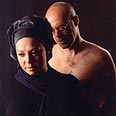
Motti Lerner

'Hard Love.' Doubt and faith, agnosticism and heresy
Photo: Eyal Landsman
Motti Lerner is one of Israel’s
most celebrated playwright’s. He has written over 10 internationally acclaimed plays, including "Exile in Jerusalem", "The Murder of Isaac", "Passing the Love of Women", and "Hard Love".
His works have received awards for over 25 years; Best Play Award for "Kastner" (1985), Prime Minister of Israel Award for Writers (1995), Best One-act Play for "Coming Home" (2002), and many more.
Lerner was born in Zichron Yaacov, a small town south of Haifa. His great-grandparents immigrated to pre-state Israel in 1882 from Romania and Russia, and became farmers. Lerner’s early education was received at the local and regional schools.
In 1967-1970, he studied mathematics and physics at The Hebrew University of Jerusalem. In 1975, he switched his focus to theater within the same university, and continued on to participate in theater workshops in England and San Francisco.
He founded and directed the Maduga Experimental Theater in 1977, as part of The Jerusalem Theater. He produced experimental and street performances. Since he opened this theater, he has been working successfully ever since throughout Israel, Europe, and The United States.
His play, "Hard Love", launched recently at The Toronto Centre for The Arts. It follows Hannah and Zvi who are reuniting after divorce twenty years earlier. The couple was raised in Jerusalem’s ultra-orthodox Mea Shearim. Their relationship ultimately ended when Zvi turned his back on Judaism and Hannah chose not to follow. In present day, their teenage children from second marriages have become romantically involved which forces them to reenter each other’s lives.
I contacted Motti Lerner for an interview to discuss his thoughts on "Hard Love". He chose instead to send me a short essay outlining his inspiration for the play, with many wonderful anecdotes included.
My original intention was to pull some quotes from the essay, but I am going to share it with you in hopes you enjoy his stories as much as I do.
Notes about 'Hard Love' by Motti Lerner
"Hard Love" is a play about doubt and faith, about agnosticism and heresy. Above all it's about love. In the summer of 1979 I was living in Jerusalem in a corner of the ultra-Orthodox Mea Shearim neighborhood.
Although I was very secular, I found myself spending more and more time with a group of Breslov Hasidim that lived in the same neighborhood. At the beginning I only chatted with them in the street, but soon later I joined them for lessons at their yeshiva, had Friday night meals with them, and even went to the Wailing Wall to pray with them.
I was 30 years old and making my first steps in the theater. It was a phase of huge uncertainty in my life. Gradually I found in that Braslav Hasidic group a promise for certainty, for a clear understanding and for finding deeper meaning in my life. By the end of the summer I was spending long hours with them almost every day.
On the eve of Rosh Hashana, I returned from the theater to my apartment, and spent the afternoon alone. At sundown I heard the voices of the Breslov Hasidim beneath my window. We had decided earlier to go together to the Rosh Hashana prayer service at the Wailing Wall. I was just about to join them, but I suddenly began hesitating. I had a clear feeling that if I joined them at the Wailing Wall for the prayer, I would stay with them forever and ever. This thought was too frightening to bear.
In spite of the doubts and the uncertainty I didn't want to lose the secular world I lived in: The theater, the university, the freedom to love and to create. After a moment I opened the window and told them that I was staying at home. They didn't try to change my decision and left. Later that night, on their way back from the Wailing Wall, they called me again. I heard them and did not answer.
To this very day, when I look back to that crucial moment in my life and try to understand it, I try to affirm my feeling that I made the right choice, that I didn't run away, that in spite of the loneliness in life without God, I was able to find bridges to the hearts of human beings.
There was also a woman involved in this choice. We have already been living together for a while. She was a third year law student at the Hebrew University in Jerusalem. At that summer she began meeting with a group of women who were in the process of returning to religion - Ba'alot Tshuva - and after a while she left our apartment and joined them. Living unmarried with me has become impossible.
After she left I didn't see her for a number of years. One evening I met her accidentally in the Jerusalem Theater lobby. Her head was shaved and covered. She was married. She already had several children. I was happy to see her, and even more happy to see her at the theater. I tried to shake her hand, but she refused. She mumbled an apology, and left the theater before the show began, in order to avoid seeing me.
I began writing "Hard Love" 20 years afterwards. At the beginning I thought I was exploring my separation from the woman I loved who completely disappeared from my life. But as I proceeded with the writing, I realized that it isn't only about that personal incident.
I gradually discovered that I was writing about two major questions that have troubled me almost all my adult life. Is it possible to live in a world without God and still be good and decent human being without Him? And on the other hand – Has the belief in God made our world a better place to live in, and our worship of Him made us better and more decent human beings?
The more I wrote the more I felt how that the play actually dealt with my deep fear that the secular Jewish identity, which I had built and cherished in the course of long, hard years, was not as stable and firm as I thought. Only after I had finished writing I realized how afraid I still was that one day, when I'm not prepared, the awful God will burst into my life, get a hold on my neck, and roar at me: "Either you believe, or you die!", and then will drag me by my hair into one of the Yeshivas at Mea Shearim. Apparently my fear of God will never abate.
Our world today is a God-stricken world. Too many kill in His name and too many die in His name. His voice is heard at every corner. He is quoted from dawn to dusk in every conversation in every continent; his sayings are visible on billboards, in giant letters in almost every language. Living purposeful and significant in such a world without giving in to the sovereignty of this God is a great victory of the human spirit.
Reprinted with permission from Shalom Life
- Follow Ynetnews on Facebook















